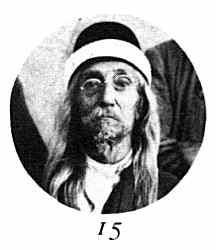
Mishkín-Qalam
(The Musk Scented - Jet Black Pen)
Áqá Husayn-í-Isfahání
(also known as Mírzá Husayn)

The 15th Apostle of Bahá'u'lláh
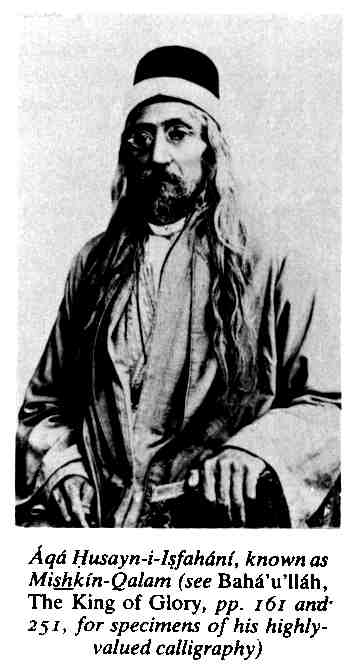
Áqá Husayn-í-Isfahání, also known as Mishkín-Qalam, was a calligrapher of the first rank. A poet, keen of mind and whit. He had many wealthy patrons but he preferred to travel as a wandering darvish, with few possessions. He first heard about the Faith in Isfahán, later he learned more while in Baghdád from Zaynu'l-Muqarrabin and Nabíl-i-A'zam, (author of "The Dawnbreakers"). He was in Adrianpole when he first met Bahá'u'lláh and became His follower. When Bahá'u'lláh was exiled to 'Akká, Mishkín-Qalam and three other Bahá'ís were sent to the Island of Cyprus along with Mirzá Yahyá. (SEE 'Four on an Island'). He eventually was released and came to the Holy Land in 1886. After the passing of Bahá'u'lláh, in 1892, he traveled to Egypt, Damascus and India (circa 1905). Old and sick he was called to the Holy Land by 'Abdu'l-Bahá where he taught calligraphy in Bahji until he passed away in 1912.
It is his rendering of the "Greatest Name", with which, we are most familiar.
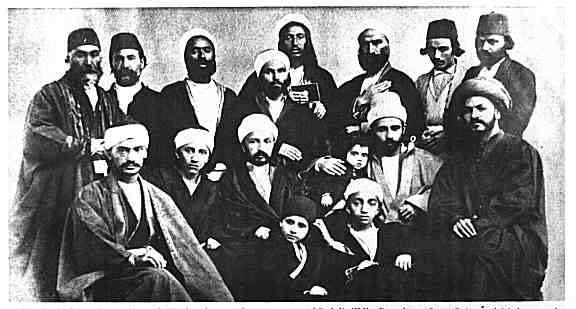
Mishkín-Qalam (back row center), Nabil-i-A'zam (to his right) and in the
forefront no less than Mirza Mihdi and 'Abdu'l-Bahá
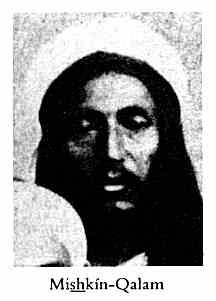
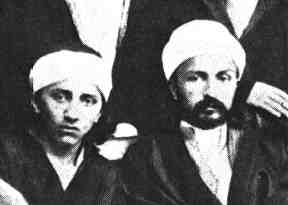
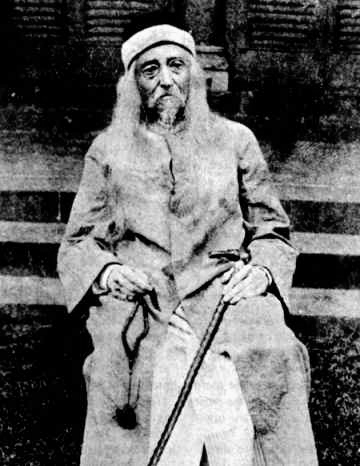
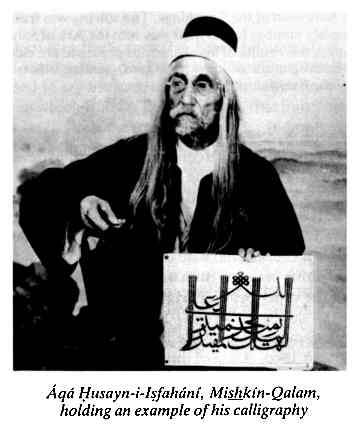
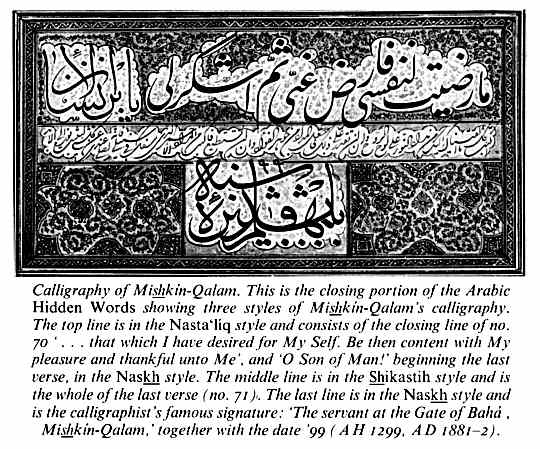
This is what 'Abdu'l-Bahá had to say about him
Among the exiles, neighbors, and prisoners there was also a second Mir Imad,(1) the
eminent calligrapher, Mishkín-Qalam.(2) He wielded a musk-black pen, and his brows
shone with faith. He was among the most noted of mystics, and had a witty and subtle mind.
The fame of this spiritual wayfarer reached out to every land. He was the leading
calligrapher of Persia and well known to all the great; he enjoyed a special position
among the court ministers of Tihran, and with them he was solidly established.(3) He was
famed throughout Asia Minor; his pen was the wonder of all calligraphers, for he was adept
at every calligraphic style. He was besides, for human virtues, a bright star.
This highly accomplished man first heard of the Cause of God in Isfahán, and the result
was that he set out to find Bahá'u'lláh. He crossed the great distances, measured out
the miles, climbing mountains, passing over deserts and over the sea, until at last he
came to Adrianople. Here he reached the heights of faith and assurance; here he drank the
wine of certitude. He responded to the summons of God, he attained the presence of
Bahá'u'lláh, he ascended to that apogee where he was received and accepted. By now he
was reeling to and fro like a drunkard in his love for God, and because of his violent
desire and yearning, his mind seemed to wander. He would be raised up, and then cast down
again; he was as one distracted. He spent some time under the sheltering grace of
Bahá'u'lláh, and every day new blessings were showered upon him. Meanwhile he produced
his splendid calligraphs; he would write out the Most Great Name, Ya Bahá'u'l-Abhá, O
Thou Glory of the All-Glorious, with marvelous skill, in many different forms, and would
send them everywhere.(4)
He was then directed to go on a journey to Constantinople, and set out with
Jinab-i-Sayyah. When he reached that Great City, the leading Persians and Turks received
him with every honor at first, and they were captivated by his jet black, calligraphic
art. He, however, began boldly and eloquently to teach the Faith. The Persian ambassador
lurked in ambush; betaking himself to the Sultan's vazirs he slandered Mishkín-Qalam.
"This man is an agitator," the ambassador told them, "sent here by
Bahá'u'lláh to stir up trouble and make mischief in this Great City. He has already won
over a large company, and he intends to subdue still more. These Bahá'ís turned Persia
upside down; now they have started in on the capital of Turkey. The Persian Government put
20,000 of them to the sword, hoping by this tactic to quench the fires of sedition. You
should awaken to the danger; soon this perverse thing will blaze up here as well. It will
consume the harvest of your life; it will burn up the whole world. Then you can do
nothing, for it will be too late."
Actually that mild and submissive man, in that throne city of Asia Minor, was occupied
solely with his calligraphy and his worship of God. He was striving to bring about not
sedition but fellowship and peace. He was seeking to reconcile the followers of different
faiths, not to drive them still further apart. He was of service to strangers and was
helping to educate the native people. He was a refuge to the hapless and a horn of plenty
to the poor. He invited all comers to the oneness of humankind; he shunned hostility and
malice.
The Persian ambassador, however, wielded enormous power, and he had maintained close ties
with the ministers for a very long time. He prevailed on a number of persons to insinuate
themselves into various gatherings and there to make every kind of false charge against
the believers. Urged on by the oppressors, spies began to surround Mishkín-Qalam.
Then, as instructed by the ambassador, they carried reports to the Prime Minister, stating
that the individual in question was stirring up mischief day and night, that he was a
trouble maker, a rebel and a criminal. The result was, they jailed him and they sent him
away to Gallipoli, where he joined our own company of victims. They despatched him to
Cyprus and ourselves to the 'Akká prison. On the island of Cyprus, Jinab-i-Mishkín
was held prisoner in the citadel at Famagusta, and in this city he remained, a captive,
from the year 85 till 94.
When Cyprus passed out of Turkish hands, Mishkín-Qalam was freed and betook
himself to his Well-Beloved in the city of 'Akká, and here he lived encompassed by the
grace of Bahá'u'lláh, producing his marvelous calligraphs and sending them about. He was
at all times joyous of spirit, ashine with the love of God, like a candle burning its life
away, and he was a consolation to all the believers.
After the ascension of Bahá'u'lláh, Mishkín-Qalam remained loyal, solidly
established in the Covenant. He stood before the violators like a brandished sword. He
would never go half way with them; he feared no one but God; not for a moment did he
falter, nor ever fail in service.
Following the ascension he made a journey to India, where he associated with the lovers of
truth. He spent some time there, making fresh efforts every day. When I learned that he
was getting helpless, I sent for him at once and he came back to this Most Great Prison,
to the joy of the believers, who felt blessed to have him here again. He was at all times
my close companion. He had amazing verve, intense love. He was a compendium of
perfections: believing, confident, serene, detached from the world, a peerless companion,
a wit - and his character like a garden in full bloom. For the love of God, he left all
good things behind; he closed his eyes to success, he wanted neither comfort nor rest, he
sought no wealth, he wished only to be free from the defilement of the world. He had no
ties to this life, but spent his days and nights supplicating and communing with God. He
was always smiling, effervescing; he was spirit personified, love embodied. For sincerity
and loyalty he had no match, nor for patience and inner calm. He was selflessness itself,
living on the breaths of the spirit.
If he had not been in love with the Blessed Beauty, if he had not set his heart on the
Realm of Glory, every worldly pleasure could have been his. Wherever he went, his many
calligraphic styles were a substantial capital, and his great accomplishment brought him
attention and respect from rich and poor alike. But he was hopelessly enamored of man's
one true Love, and thus he was free of all those other bonds, and could float and soar in
the spirit's endless sky.
Finally, when I was absent, he left this darksome, narrow world and hastened away to the
land of lights. There, in the haven of God's boundless mercy, he found infinite rewards.
Unto him be praise and salutations, and the Supreme Companion's tender grace.
('Abdu'l-Bahá: Memorials of the Faithful, Pages: 97-101)